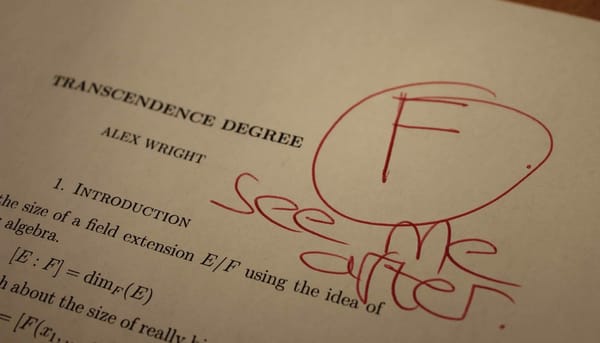Oh Gee a Point Average
A quick word on the GPA. All too quick, unfortunately.
A while ago some universities announced the possibility of using a UK GPA instead of the traditional grading system that we use. This is an interesting idea, and one that is worthy of debate. The College will at some point ultimately have to choose whether or not they switch. Imperial are a cautious lot: College tend to wait until something is tried and tested rather than dive straight in. Maybe it’s the scientist mind set. Of course, this is both good and bad – it depends on the situation and context. Here, it will just give more time to mull over the idea. If many other UK universities switch, Imperial will start having serious discussions. If this ever does become a big topic, the upper management of College would be wise to consult with students and staff. The forgotten victims of examinations are often the lecturers and PhD students that have to mark the papers. It’s unlikely they will be keen to support a proposal that makes each piece of assessment critical and therefore puts them under a lot of extra strain.
In essence, I think the current system is fine as it is. It allows people to give exact marks if they want and employers to ask for exact scores if they are so inclined. That little buffer in the current system is great for markers, students, and employers. You’ll always have the grey area of overlap where 59 and 61 aren’t too different from each other – but that is fixable by someone saying on a CV that they were that close. It does cause a problem if you are not allowed to apply for a job unless you have a 2:1, but a GPA doesn’t fix that really.
Interestingly, the GPA will essentially break up the grades into smaller sub grades. It’s like if you had low 2:1, mid 2:1 and high 2:1 on the degree instead of just 2:1.
So, will employers start asking for higher grades? Probably not. If they wanted to, they could already say that nobody with less than a first or 65% shouldapply (and check transcripts to see if people lie). If they ask for a grade it will be the same range as before, just under a different name. They will want rounded people with loads of interests and who fit into their ethos and all that other stuff.
Employers understand that wiggle room is needed, as grades are not 100% spot on. Bad day in the exam hall and that could be a knock to your average; labs are marked by humans who may make mistakes or be a bit erratic in marking (in a standard human way), and so on and so forth. It boils down to the fact that marking is not as exact as you wish it would be. Employers went to university themselves (that person interviewing you was a student once) and so know all of this. If they do not understand, then universities should inform them.
Will people start getting tactical with options? Hell yes, but they do that already. Only those that truly love their subject chose options based on interest, the rest just go with what’s the ‘easiest’ option. There is also the danger of grade inflation. With people aiming for what used to be a high 2:1 there is a temptation for universities to keep students happy and to riseup the league tables by giving out higher grades. Of course with a system like this people will be more stressed out and worried. They will want to get certain grades that have smaller margins of error. This gets circular in a way: again, you have the issue of someone having e.g. 63% and 65% possibly getting a different classification. Just like before the lines are blurry, but now there’s a bigger blur to sharp ratio. This is why, in all likelihood, employers will still want the 2:1 equivalent and above. They need to draw a line somewhere, why change that line’s position for no real reason? You possibly get people who are 3% ‘better’, but is that really ‘better’ at the job you will give them? More motivated? Better at working in a team? Some other business jargon? Nope. That’s why you interview them and look at their cover letter, CV, and experience.







